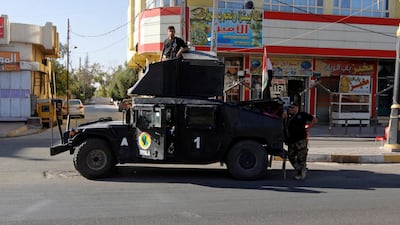One US civilian contractor was killed and four American forces were wounded on Friday in an attack on a joint base in Kirkuk, Iraq, the Pentagon announced.
The rocket attack targeted the K1 Iraqi military base in Kirkuk, an oil-rich region north of Baghdad, hosting coalition troops.
“One US civilian contractor was killed and several US service members and Iraqi personnel were wounded," a statement by the US Central Command confirmed.
Operation Inherent Resolve (OIR), the American-led coalition to fight the so-called Islamic State, said that “Iraqi Security Forces are leading the response and investigation,” to the incident, in a statement to the National following the attack in which 30 rockets were fired, a US official told AFP in Washington.
No group has claimed responsibility for the incident and investigations into the attack are ongoing. However, US officials speaking anonymously to Reuters stated they were looking into the “possible involvement” of Iranian-backed militia Kataib Hezbollah.
Kataib Hezbollah is a prominent militia closely tied to Iran with a long history of operations against US military interests in Iraq. The group is led by Iraqi-Iranian Abu Mahdi al-Muhandis, a leader within the Popular Mobilisation Forces (PMF) who previously worked with Iran’s Revolutionary Guard in opposition to Saddam Hussein.
“We are waiting for an investigation and do not have details about who was behind the attack,” said Tahseen Khafajy, the spokesman of the media office at Iraq’s Defense Ministry. He added that the recent series of rocket attacks was linked to ongoing insecurities within Iraq.
“It’s a very difficult situation,” he stated, “There are protests and Daesh [the Arabic acronym ISIS] is coming back. There are many reasons for these attacks both political and societal.”
ISIS operates in the area neighboring the site of the military base, and have increasingly been using insurgency in as it attempts to regain a foothold in the province.
“The Coalition is unwavering in our commitment to defeat ISIS remnants with our Iraqi Security Forces partners,” added OIR in its statement to the National.
US Secretary of State Mike Pompeo blamed Iranian proxies in the country for launching an attack at a joint facility in Baghdad on December 9.
In a statement issued two weeks ago Mr Pompeo threatened Iran with “a decisive US response” if these attacks continue. “We must also use this opportunity to remind Iran’s leaders that any attacks by them, or their proxies of any identity, that harm Americans, our allies, or our interests will be answered with a decisive US response,” Mr Pompeo said. But it was unclear if Friday’s attack crossed a US redline.
Ryan Bohl, a Middle East analyst at the intelligence firm Stratfor, said any US response “will depend on who did it.”
ISIS is also a suspect. “Kirkuk is typically ISIS territory but we can't totally rule out an Iranian aligned Popular Mobilisation Forces [behind the operation],” Mr Bohl said. Even after its territorial defeat, ISIS continues to carry guerrilla attacks in Kirkuk against Iraqi police and security officials.
If an Iranian proxy group is behind the attack, then “the US will be strongly pressured to retaliate,” Mr Bohl argued. “It will show their proxies are not deterred from harassing troops by US threats and US action in Iraq.” A response, he reckoned, could entail fortifying the bases and/or targeting the group behind the attack.
OIR did not respond to inquiries on whether they considered this to be another attack by an Iranian proxy, or on whether the United States plans to respond.
US Defense Secretary Mark Esper told reporters earlier this month that he had expressed "concern about the optics in attacks on bases in Iraq where US troops and material might be," in a call with outgoing Prime Minister Adel Abdel Mahdi.
The US has "a right of self-defense, that we would ask our Iraqi partners to take proactive actions... to get that under control, because it's not good for anybody," he said.
Mr Abdel Mahdi's office called on everyone "to spare no effort to prevent an escalation that will threaten all parties," warning that "unilateral decisions will trigger negative reactions that will make it more difficult to control the situation."
Tensions between Iran and the United States have soared since Washington pulled out of a landmark nuclear agreement with Tehran last year and enacted crippling sanctions.
Baghdad - which is close to both countries - is worried about being caught in the middle.














